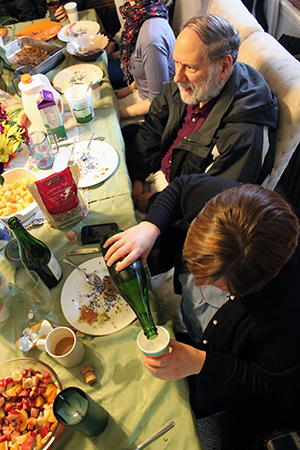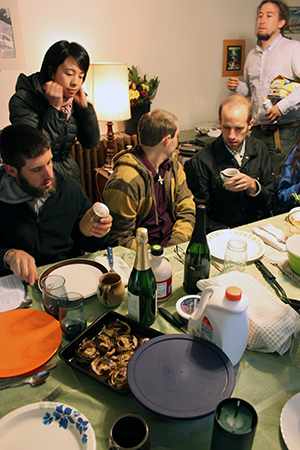 I’ll be honest: Most days, I manage to read the Bible without letting the full weight of its message hit me. I somehow imagine that I can be a follower of Jesus without taking up his cross and drinking the cup that he did. I like to pretend that it’s possible to be a Christian without totally re-thinking my whole way of life.
I’ll be honest: Most days, I manage to read the Bible without letting the full weight of its message hit me. I somehow imagine that I can be a follower of Jesus without taking up his cross and drinking the cup that he did. I like to pretend that it’s possible to be a Christian without totally re-thinking my whole way of life.
There are lots of us pretending. Mainstream Christianity often seems to consist largely of attempts to be a good person, learning to follow the basic rules of kindness, generosity, and good citizenship. In this view, a successful Christian is one who stays out of trouble, avoiding the big sins – like murder, fraud, and adultery. This brand of Christianity avoids anything that smacks of questionable behavior. You know: I don’t smoke and I don’t chew and I don’t go with boys who do. For all our talk of discipleship, in practice, popular Christianity often seems fixated on the quest to become a respectable, law-abiding, productive member of society.
 But is that really what it means to follow Jesus? The disturbing conclusion that I come to as I read the Bible is that God has little interest in how tidy and respectable my life is. Most of God’s favorite people have been the least honorable, the least polished and popular. Think of Ezekiel, who made a public spectacle of himself and cooked his food on manure. Or Paul, who lived like a vagabond, was regularly beaten by mobs, and landed himself in prison on many occasions. Look at Jesus: the author and perfecter of our faith was nailed to a cross, a manner of execution that Rome reserved for failed insurrectionists. Jesus was anything but respectable!
But is that really what it means to follow Jesus? The disturbing conclusion that I come to as I read the Bible is that God has little interest in how tidy and respectable my life is. Most of God’s favorite people have been the least honorable, the least polished and popular. Think of Ezekiel, who made a public spectacle of himself and cooked his food on manure. Or Paul, who lived like a vagabond, was regularly beaten by mobs, and landed himself in prison on many occasions. Look at Jesus: the author and perfecter of our faith was nailed to a cross, a manner of execution that Rome reserved for failed insurrectionists. Jesus was anything but respectable!
How did we get to this point? When was Christianity transformed from being a faith of the cross, becoming instead a helpful philosophy of good works and pious beliefs? Since when is Jesus a savior who teaches people to play by the rules, watch our language, and generally to lead quiet, socially acceptable lives? When did the rugged and narrow path of discipleship become a smooth highway to life as an upstanding citizen?
 Don’t get me wrong, I like responsible, orderly people. I’m sure you do, too. But the prophets would never be described that way; they were fierce individuals who spoke the very words of God to people and nations desperately in need of a wake-up call. Paul wasn’t president of the Rotary Club; he was a madman for the gospel. Same goes for Francis of Assisi, George Fox, Margaret Fell, John Woolman, and just about any other saints we can think of. The prophetic message of the gospel brings vibrant life and astonishing power, but respectable, predictable and family friendly are not words that I would use to describe it.
Don’t get me wrong, I like responsible, orderly people. I’m sure you do, too. But the prophets would never be described that way; they were fierce individuals who spoke the very words of God to people and nations desperately in need of a wake-up call. Paul wasn’t president of the Rotary Club; he was a madman for the gospel. Same goes for Francis of Assisi, George Fox, Margaret Fell, John Woolman, and just about any other saints we can think of. The prophetic message of the gospel brings vibrant life and astonishing power, but respectable, predictable and family friendly are not words that I would use to describe it.
What will it take for us Christians to get off of this treadmill of personal piety? What more do we need to move from generic morality to the foot of the cross? How might we be inspired to embrace the discomfort, unpredictability and shame of the path that Jesus walked? Are we ready to experience the kind of discipleship that brings us to our knees in Gethsemane, praying: Abba, Father, for you all things are possible; remove this cup from me; yet, not what I want, but what you want.
This is the kind of discipleship that moves mountains; this unvarnished gospel confronts our deep-seated need to be comforted, to be approved of by others. Only when we let go of being good people are we free to become the fearless disciples that we read about in the book of Acts, who are prophesied of in the book of Joel:
Then afterward
I will pour out my spirit on all flesh;
your sons and your daughters shall prophesy,
your old men shall dream dreams,
and your young men shall see visions.
Even on the male and female slaves,
in those days, I will pour out my spirit.
Has this moment arrived for you? Is God giving you visions and dreams? Is the Spirit inspiring you with words to speak, and actions that speak louder than words? Are you ready to surrender your self-image as a respectable person, embracing the path that Jesus walked? Can you drink this cup?